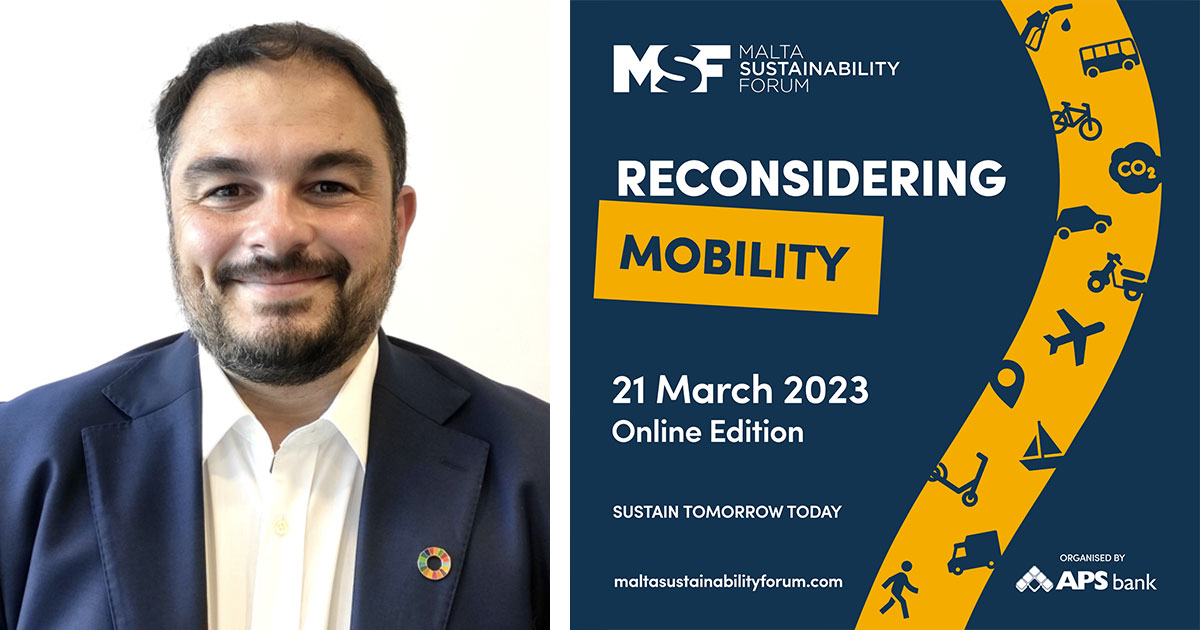Time is running out if Malta is to achieve its legally binding carbon emission targets – and with transport accounting for over a third of all emissions on the island, change is clearly needed in this sector.
This was the overall message conveyed by the speakers and panellists at a webinar organised by the Malta Sustainability Forum (MSF) – an APS Bank initiative – on the topic of ‘Reconsidering Mobility’, reflecting the overarching theme of ‘Sustain Tomorrow Today’.
Malta’s share of emissions from transport is considerably higher than the 25 per cent EU average – with 60 per cent of those emanating from personal transport. However, what was described by Prof. Maria Attard from the University of Malta as “our love affair” with our cars – 780 of them for each 1,000 population in 2020 – has made it hard to change behaviour, despite the various alternatives available.
The webinar lauded efforts to electrify transport – from cars to buses – mandated by the phasing out by 2035 of vehicles powered by fossil fuels. However, the participants warned that this would not be enough to make a difference in the long run if Malta is to reach its carbon emission targets, a warning made by the APS Bank Chief Strategy Officer Liana DeBattista.
The discussion started with a sobering statistic: the European Commission estimates that congestion, noise and air pollution from traffic cost the economy some €400 million in 2022 and up to five per cent of Malta’s GDP is lost due to issues of traffic. The impact, therefore, is not only on short-term frustration but also on medium-term and long-term health and wellbeing. Speaker Martins Zemitis from the EC Representation in Malta warned that this true cost was not being reflected in what people pay to get around, especially if the environmental cost was factored in. There are 2,800 km of roads on the island, taking up 50 per cent of all public space, which does not even take into account the space taken up by parking.
The introductory message from the President of Malta, Dr George Vella set the tone for the rest of the webinar: “If we are to reach the Sustainability Development Goals, we need commitment.”
Indeed, the key message was that most of the problems had already been outlined in the Transport Strategy and Transport Masterplan in 2015 but that little had been achieved in the meantime. As Prof. Attard said, it had been so ineffectual in practice that a new strategy is being drawn up – even though the period covered by the original one still had two years to run.

The problems are well known by anyone who ventures outside their home but what are the solutions? The panellists had a list of definitive actions, warning that these might not be popular in the short-term but would reap benefits in the medium and long term. One important point was that people needed to change their behaviour and consider using other means of transport, from walking to cycling to using public transport and scooters, sometimes with trips combining more than one mode of transport.
However, the way forward would be to complement – and not to replace – use of the car when necessary, with the ultimate aim of slowly but surely reducing congestion which would then make public transport faster and more convenient as an option, something that was emphasized by the Operations Director of Malta Public Transport David Álvarez García. Indeed, one of the most important points made by Camille Bon from Project Aegle Foundation was to motivate change by encouraging people to switch just one trip a week to another form of transport, as this would eventually loosen the automatic assumption that the car was the only way to get from one point to another.
“Indeed, most of us are happy to walk or use other forms of transport when we are overseas, but then rely on our cars again the moment we get back,” moderator Dr Wendy Jo Mifsud pondered.
“Is there enough will to move away from the way we do things now?” asked eCabs CEO Dr Bezzina, saying that incentives would be better aimed at individuals than through subsidies to operators.
Entrepreneur Alan Camilleri also stressed that the solutions needed to be driven by a mixture of carrots and sticks, giving an example of the increasing use of ride-sharing because of the campaign against drink-driving. He stressed that if demand increased, then the private sector would invest in ensuring that there was sufficient supply.
“We are not evangelists but operators,” he said, explaining that there had to be a facilitative context before anyone would invest.
Most multimodal solutions are second nature to most of the 150,000 expatriates living on the island, as they are less likely to purchase a car, Mr Camilleri added.
“Not everyone on the island has a car and that is not only because they cannot have one – because of age, expense or logistics – but because they don’t want one.”
Interestingly enough, there were very few solutions which relied entirely on the policymakers, except for the provision of bus lanes and the removal of some parking spaces, and even large-scale projects like a metro and Gozo tunnel were played down by the participants until other existing alternatives were properly exploited. As Mr Zemitis said: “Why fix it, if it is not broken?”
In my concluding remarks I referred to the President’s warning that the time to act was closing:
“There are alternatives to cars, but we need collective willpower to change things, from policymakers to public transport operators, from businesses to individuals. The options showed by Dr Suzanne Maas – of Friends of the Earth Malta – in her case studies prove that there are viable options which will benefit people in terms of time, health and well-being as well as the wider Maltese economy.”
Matthew Swain, Senior ESG Manager, APS Bank plc

